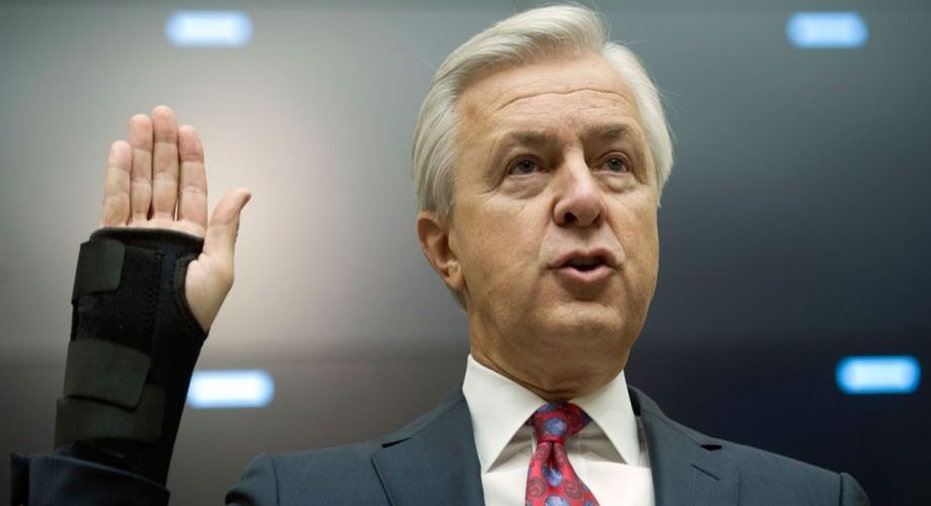This Is Why Congress Is After Wells Fargo CEO Stumpf

What do Congress and the media have in common? They salivate over red meat like a pack of wild animals. And when the victim is the CEO of a big bank, now that’s a rare treat they can’t help but pounce on.
It wasn’t enough for Elizabeth Warren and the Senate Banking Committee to beat Wells Fargo chief executive John Stumpf to a pulp last week. Yesterday it was a House panel’s turn to pummel the executive. And the media just ate it all up.
Headlines ran the gamut of violent metaphors, from “Wells Fargo CEO roasted on Capitol Hill” and “A parade of lawmakers rip into CEO John Stumpf” to “US House panel lambasts Wells Fargo boss over phantom accounts” and Lawmakers take more swings at Wells Fargo CEO John Stumpf.”
One story I read said, “For many of the angered lawmakers, the scandal is personal. They hold accounts with Wells Fargo or have taken out mortgages.” During the hearing, Rep. Jeb Hensarling of Texas said he had a mortgage with the bank and wished he didn’t, adding “If I could, I’d pay it back.”
Empathizing with constituents and feeling consumers’ pain is one thing – that’s part of a congressman’s job – but that does not explain much of the over-the-top rancor and irresponsible claims levied against the CEO and his company on capitol hill.
Massachusetts Rep. Michael Capuano said Stumpf reminded him “of the guys who ran Enron and Arthur Anderson,” adding, “You and your entire leadership team are clearly and unequivocally guilty of at least conspiracy to commit fraud.”
Who needs the criminal justice system when we have grandstanding politicians like Capuano to act as judge and jury. Who needs an indictment, a trial, a conviction and a sentence; just lock up the whole management team and throw away the key.
Let me remind everyone: The Wells Fargo fraud consisted of 2 million accounts being opened or credit cards issued, the vast majority of which were free. A grand total of $2.6 million in fees were collected, all of which have been refunded. That’s more or less the extent of the damage.
Enron’s massive accounting scandal, on the other hand, resulted in the bankruptcy of a $60 billion energy giant with 20,000 employees. Comparing that or the sub-prime mortgage crisis to what happened at Wells Fargo, as some lawmakers did, is like comparing the Grand Canyon to a crack in the sidewalk. It’s ludicrous on its face.
Meanwhile, Rep. Carolyn Maloney accused Stumpf of dumping $13 million worth of Wells Fargo stock after learning about the fraud and called the bank “a school for scoundrels.” Rep. Gregory Meets said the CEO of the nation’s largest bank was running “a criminal enterprise,” and joined a chorus of senators and representatives who called for the 34-year bank veteran to be fired.
Let me explain where all this is coming from. This is an election year. A very special election year with two unpopular candidates running for president and hundreds of lawmakers scared for their precious jobs. I’m sure some of these politicians speak with conviction, but make no mistake, the grandstanding is selfish and self-serving.
I guarantee that the taxpayer dollars spent digging up dirt, writing stirring speeches and coming up with sensational sound-bites, not to mention the investigations and indictments that will surely follow, will end up costing you and me far more than the so-called massive fraud that cost affected customers all of $1.30 per account, on average.
And whatever happened to journalists reporting the facts? On a business news program just ahead of yesterday’s hearing, a reporter – not a commentator, mind you, but a reporter – said, and I’m paraphrasing from memory here, “let’s all hope the Department of Justice would do its job and indict Stumpf.” The on-air anchor seemed as shocked as I was.
And everyone wonders why we’re living in a “shoot first, ask questions later” world. When our political leaders and the media couldn’t care less about the facts, is it any wonder we end up with citizens who, like Capuano, consider a little thing like the presumption of innocence to be superfluous.
Is it any wonder we see and hear people rush to judgement all day long, like this one:
@SteveTobak Yes because those employees were doing what they were instructed to do. Now they are the scapegoats for the execs.
— Billy Martin (@anvil7192) September 23, 2016
And this one:
@SteveTobak @WellsFargo MOVED MONEY in customer accounts. CEO earning $14MM/year not responsible for issue w/ 5K employees? #ownitstumpf
— George Joeckel (@idbygeorge) September 23, 2016
Look, don’t get me wrong. I’m no apologist for the bank or its CEO. When Stumpf said, “We should have done more sooner” during his prepared statement, that was quite an understatement. It’s hard to believe that nobody thought to implement tighter controls and dial back their insanely aggressive “Eight is Great” cross-selling goal years ago.
In my view, some of the bank’s execs are probably guilty of negligent oversight, overzealous growth metrics, and stupidity. Stumpf’s performances before Congress have been weak, at best. When it comes to accountability, he says the words but doesn’t come across that way. And recent clawbacks were not proactive, as they should have been.
But aside from the 5,300 branch employees and managers the bank fired over five years, we don’t know squat about the culpability of high-level executives like Stumpf and former retail head Carrie Tolstedt. And hours of grilling and grandstanding by both Senate and House banking panels didn’t tell us anything we didn’t know two weeks ago.
So, what was the point of all this? Votes for the politicians and ratings for the media.



















